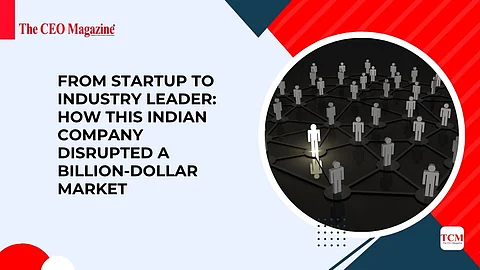
- News
- Women
- Magazine
- IndustryIndustry
- InsightsInsights
- Success Stories
- PublishPublish
- ContactContact
- Media KitMedia Kit

Indian Company Disrupted a Billion-Dollar Market
Just a few years ago, Indian startups hitting billion-dollar valuations felt like outliers. Now, they’re part of a booming herd.
But here’s the question I hear more often these days:
“What’s next for Indian unicorns?”
As someone who closely follows the pulse of India’s startup ecosystem — from boardroom brainstorms in Bengaluru to investor panels in Delhi — I believe we’re entering a bold new chapter.
And if you're a founder, investor, or startup strategist, you need to be paying attention.
Let me take you inside the numbers, the narratives, and the next wave of opportunity.
India has produced over 110 unicorns as of 2024 — a staggering leap from just 10 a decade ago.
“India is no longer playing catch-up. It’s setting the pace.” — Nandan Nilekani, Infosys Co-founder
Total valuation of Indian unicorns: $350+ billion
Sectors leading the unicorn pack: Fintech, Edtech, SaaS, E-commerce
Average time to unicorn status: 6.5 years (down from 10 in 2015)
What changed?
A surge in digital adoption (especially post-COVID)
Strong domestic consumer demand
Increased global VC interest in Indian markets
Government push via Startup India, Digital India
But here’s where it gets real…
Unicorn status used to mean a blitzscale-to-the-top strategy. Now? Investors and markets are asking tougher questions:
Are you profitable?
What’s your real burn rate?
Can you sustain this valuation?
Take Zomato, for example. Its IPO was a landmark — but its stock performance revealed how public markets demand more than scale — they demand sustainability.
This shift has redefined what it means to be a unicorn in India.
And it’s leading to five big changes you need to understand.
In my conversations with VCs and startup founders alike, one theme keeps emerging:
“The valuation hype is fading. Now it’s about real value — to users, to investors, to the ecosystem.”
Expect more focus on fundamentals — revenue, margins, and customer retention.
Down rounds (lower valuations in new funding) are becoming more common — and less taboo.
Founders will need to master investor storytelling with clarity on growth paths and profitability.
Tip:
If you're pitching investors in 2025, don’t lead with TAM (Total Addressable Market). Lead with traction, retention, and margins.
Gone are the days when Indian startups saw “global” as just the US or EU.
Now, I’m seeing unicorns expand smartly into Middle East, Southeast Asia, Africa, and other fast-growing digital markets.
Oyo tapping Southeast Asia's hospitality market
BYJU’S expanding into Middle East and North America
Freshworks making its mark in the global SaaS space via IPO
“Indian startups now have the tech, talent, and tenacity to solve global problems — not just local ones.”
Here’s the secret: It’s no longer about just exporting a product. It’s about localizing innovation to solve context-specific problems.
If you’re a founder today, you must keep one eye on policy.
From RBI's digital lending guidelines to DPDP (Digital Personal Data Protection) Act, regulations are getting sharper — and startups that ignore them may not survive long enough to scale.
Build compliant-first, not compliant-later.
Invest in legal and regulatory advisors early — not when it’s already a crisis.
Startups in fintech, healthtech, edtech will need to build trust alongside tech.
Imagine this: A billion-dollar idea that never lifts off — just because of a compliance misstep. Don’t let that be your story.
India’s IPO pipeline is heating up. But not every unicorn is IPO-ready.
Going public isn’t just about crossing a valuation threshold — it’s about governance, transparency, and long-term viability.
Zomato (2021)
Nykaa (2021)
Paytm (2021)
Delhivery, PolicyBazaar, MapMyIndia, and more
But here’s what I’ve learned:
“The IPO isn’t the end. It’s the beginning of real scrutiny.”
If you’re a founder eyeing an IPO, now is the time to:
Build a solid CFO + compliance team
Strengthen internal controls and reporting standards
Understand that public investors think very differently from VCs
The next wave won’t just be more of the same.
We’re already seeing the rise of deep tech, climate tech, space tech, and AI-first startups leading the charge.
Pixxel (space tech)
Log9 Materials (clean energy batteries)
Gupshup, Yellow.ai (AI-powered customer engagement)
Icertis, GreyOrange, Locus (enterprise-grade AI + logistics)
Why it matters:
These unicorns may not be household names — yet. But they’re solving foundational problems and will drive India’s next innovation leap.
“India’s unicorn story is shifting from consumer-first to innovation-first.”
Unicorn status is just the beginning.
The real legacy is built in the years after — when the media spotlight fades, and the real decisions begin.
So, I’ll leave you with a few hard but essential questions:
Are you building for funding rounds or for customer lifetime value?
Will your company still matter a decade from now?
Are you setting up for growth and governance?
Because the billion-dollar startups of tomorrow won’t be just “big” — they’ll be resilient, global, sustainable, and trusted.
I believe we’re not witnessing the end of the unicorn era — we’re watching it evolve.
The next generation of Indian unicorns will:
Move fast, but also think long-term.
Win globally, but with local wisdom.
Innovate with tech, but scale with trust.
So whether you’re a founder chasing that billion-dollar dream, or an investor betting on the next big wave — remember this:
The unicorns of the future won’t just be built to impress. They’ll be built to last.
Follow us on Google News
